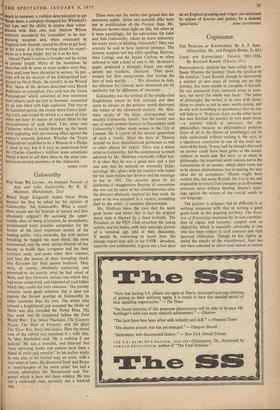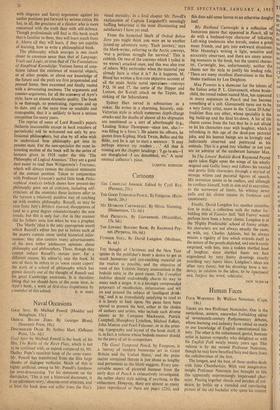Cognisance
THE PROBLEM OF KNOWLEDGE. By A. J. Ayer. (Macmillan, 18s., and Penguin Books, 3s. 6d.)
LOGIC AND KNOWLEDGE: ESSAYS, 1901-1950.
By Bertrand Russell. (Unwin, 25s.)
PHILOSOPHICAL analysis has been called by pro- fessor Wisdom the journey 'from the familiar to the familiar.' Lord Russell, though he discovered a number of new ways of setting out on this journey, has been unable to complete it himself. He has journeyed from common sense to para- dox, but never the whole way back : 'The point of philosophy [he writes] is to start with some- , thing so simple as not to seem worth stating, and to end with something so paradoxical that no one will believe it.' Professor Ayer, on the other hand, has now finished the journey in very good shape —a journey which is necessary for the philosopher, because no philosophical problem ' (least of all in the theory of knowledge) can be fully understood without making it. He says, in a significant conclusion to one of the main sec- tions of his book, 'It may well be thought that such an answer could have been given at the outset, without so much ado. But here, as so often in philosophy, the important work consists not in the formulation of an answer, which often turns out to be almost platitudinous, but in making the way clear for its acceptance.' Moore might have written this, but never Russell; for it is in the end impossible to return from paradox to an illumined common sense without heeding Moore's warn- ings against the misuse of the crucial words in our language.
The journey is arduous; but its difficulty is as nothing compared with that of writing a good guide-book to this puzzling territory. The Prob- lem of Knowledge impresses by its rare combina- tion of vigour and maturity, coupled with an objectivity which is especially admirable in one who has been subject to such constant and such ignorant vilification. Though he has rightly ig- nored the attacks of the misinformed, Ayer has not been ashamed to admit (and indeed to restate
with elegance and force) arguments against his earlier positions put forward by serious critics. He has, in all, the greatness of a thinker who is more concerned with the truth than with self-defence. Though professionals will find in this book much that is familiar to them, they, will learn much from it. Above all they will learn, if they are capable of learning, how to write a philosophical book.
The philosophy which emerges is one much closer to common sense than that of Language, Truth and Logic, or even that of The.Foundations of Emptilcal Knowledge. Various forms of scep- ticism (about the existence of material objects, or of other people, or about our knowledge of the future and the past) are first propounded and pressed home, then examined and finally routed with a devastating neatness. The arguments and counter-arguments, for all the economy of Ayer's style, have an almost dramatic quality. The book is so thorough, so penetrating, rigorous and up to date, and at the same time so readable and manageable, that it is unlikely to have a serious competitor for many years.
The reprint of some of Lord Russell's papers (hitherto inaccessible except in back numbers of periodicals) will be welcomed not only by pro- fessional philosophers, but also by all who wish to understand how philosophy got into its present state. For the non-specialist the most in- teresting section of the book will be the series of lectures given in 1918 under the title The Philosophy of Logical Atomism.' They are a good deal easier to read than Wittgenstein's Tractatus, which will always remain the classical statement of the atomist position. Taken in conjunction with Professor Urmson's useful little book Philo- sophical Analysis (which shows how present-day philosophy grew out of criticism, including self- criticism, of the atomists) these lectures offer to the layman a relatively painless way of catching up with modern philosophy. Russell, as may be seen from July's Hibbert Journal, disapproves of (and to a great degree misunderstands) the new trends; but this is only fair—for in like manner did his fathers unto him when he was a prophet.
The `blurbs' (that is the only appropriate word) which Russell's editor has put in before each of the papers contain some useful historical infor- mation; they also contain many advertisements of his own rather adolescent opinions about philosophy and philosophers. These, though they cannot reduce Russell's, stature (nor, for a different reason, his editor's), mar the book. In one of them he refers to as 'some recent capers the work of a school of philosophy which has grown directly out of the thought of Russell and his great Cambridge associates. It is therefore fitting that we should have at the same time, in Ayer's book, a work of first-class importance by















































 Previous page
Previous page